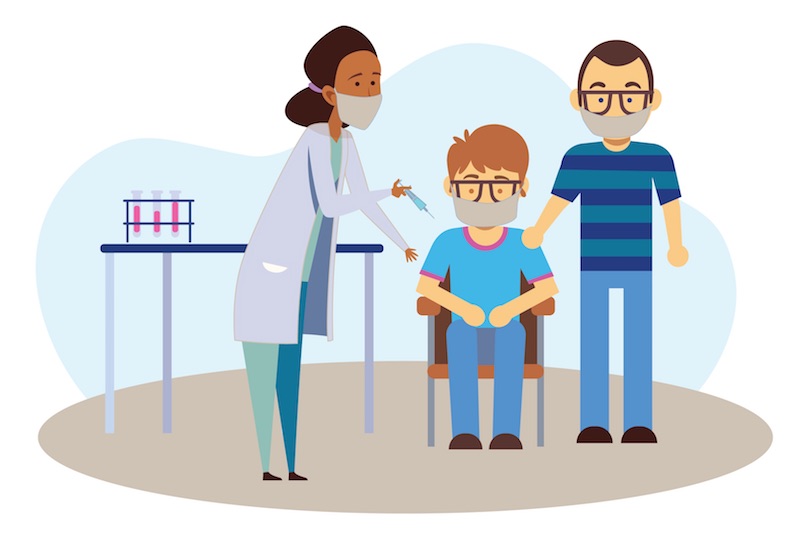Getting COVID-19 vaccines to medically fragile children

As COVID-19 vaccines slowly roll out, should children who need complex care or have serious medical conditions be vaccinated? We asked experts around Boston Children’s Hospital, and their resounding answer is: Yes, if they are age 16 or older. Boston Children’s is actively planning to make vaccination happen for as many patients as possible, as soon as possible — whether at the hospital or closer to home.
Dr. Jay Berry directs the Complex Care Service and co-directs the Cerebral Palsy and Spasticity Center at Boston Children’s and is involved in the planning. His team has compiled a list of older teens and young adults who should receive priority for COVID-19 vaccination.
“We’ve seen very few COVID-19 cases because our families have hunkered down at home and embraced telehealth,” he says. “But we worry that if precautions loosen, they’ll be at more risk, so we really want to see them vaccinated.”
When can medically fragile children get vaccinated against COVID-19?
Starting with Phase 2 of the vaccine rollout, all people age 16 and older with two or more underlying medical conditions will be eligible for COVID-19 vaccination. As for the exact timing, that varies by state. While Massachusetts entered Phase 2 on Feb. 1, first priority is going to people age 75 and older.
Boston Children’s care teams will begin to notify families once vaccine allotments are in hand and the state gives the green light. It’s hoped that this can begin in late February.
Which children are eligible in Phase 2?
The Centers for Disease Control and Prevention cites the conditions below as increasing children’s risk for COVID-19. Any child with two or more of these conditions would be eligible for vaccination if they are 16 or older:
- medical complexity
- asthma and other chronic lung disease
- congenital heart disease
- diabetes
- obesity
- severe genetic disorders
- severe neurologic disorders
- inherited metabolic disorders
- sickle cell disease
- chronic kidney disease
- a suppressed immune system (due to cancer or medications)
“We would put children who are oxygen-dependent or have a significant history of respiratory problems at the higher end of priority,” says Dr. Stacey Cook, director of outpatient care for the Complex Care Service. “Kids who tend to get sicker with flu and other respiratory viruses would be at the top of our list.”
Older teens and young adults who have (or have had) cancer will also receive priority.
“Childhood cancer survivors should be vaccinated if they meet criteria; many of them have had therapies which can leave them with abnormal neurologic, lung, kidney, or heart function” says Dr. Lisa Diller, chief medical officer of the Dana-Farber/Boston Children’s Cancer and Blood Disorders Center. “We also expect to be vaccinating children over 16 who are currently undergoing cancer treatment that leaves their immune system suppressed.”
She adds, however, that not much is known about how effective the vaccines will be in immunosuppressed patients. These patients were not included in the Pfizer and Moderna trials. “But we do know they are safe, and we expect these children can respond to immunization, based on our experience with flu vaccination in children with cancer.”
What about children under age 16?
Boston Children’s, like other medical providers, is being guided by the Food and Drug Administration (FDA). As of now, the FDA has authorized the Pfizer vaccine only for people age 16 and up, and the Moderna vaccine for people 18 and older. Both vaccines are now being tested in children as young as 12, but it will be at least several months before results are available.
If results are good, the FDA would likely extend its authorization to 12- to 15-year-olds. Only then would Pfizer and Moderna begin studying COVID-19 vaccines in children ages 5 to 11. In the United Kingdom, Astra Zeneca has approval to test its vaccine in children ages 5 to 12. Any data from these trials could potentially be considered by the FDA. However, it may be late 2021 or early 2022 before children 15 and younger can be vaccinated.
Are the COVID-19 vaccines safe in medically fragile children?
Yes, Boston Children’s considers the vaccines authorized by the FDA to be as safe in medically fragile children 16 and older as they are in healthy children.
“At this point, tens of millions of people have gotten COVID-19 vaccines with very few problems, so we feel they’re safe,” says Dr. Robert Graham of Boston Children’s CAPE Home Ventilation Program. “We try to emphasize that underlying conditions shouldn’t necessarily make the child vulnerable to a vaccine, whereas the risks of not being vaccinated are high.”
As is true for adults, if your child had serious immune or allergic reactions in the past, it may be necessary to consult with immunology specialists before getting vaccinated.
Where can I get a vaccine for my child?
Boston Children’s is currently working on the logistics of giving COVID-19 vaccines at the main hospital, its satellites, and affiliated pediatric practices. Unfortunately, because of vaccine storage requirements, it may not be possible to deliver vaccines to patients’ homes. But the hospital is looking at all options.
Many families may find it more convenient to seek a vaccine in their community.
“We can advocate for you, but your local pediatrician or family doctor may be able to identify the closest vaccine center,” says Dr. Graham.
State vaccine information sites
Click on your state for information on vaccine distribution in your area.
What about caregivers?
Currently, family caregivers have several options for getting vaccinated. Boston Children’s can provide letters of support, confirming they are caring for a child at high risk for COVID-19. Although Massachusetts has not stated that caregivers can be vaccinated in Phase 2, eligibility may be different in other states.
“Public health departments sometimes have vaccine stock, and some parents have gotten vaccinated in New England as the caregiver of medically fragile child,” says Dr. Cook. “We’re also encouraging families to touch base with their primary care providers and local pharmacies. Make sure they know you’re interested and ask if there’s a wait list. CVS and Walgreens will eventually have the ability to vaccinate, so if you happen to be calling the pharmacy anyway, ask.”
Learn more about COVID-19 vaccination.
Related Posts :
-

Three ways to ensure your child has the proper asthma medication
Children who have asthma should always have access to medication. But a manufacturer’s decision to stop producing a popular ...
-

A surgeon’s last-minute trip to Sri Lanka reduces children’s wait for needed heart repair
Last year, Dr. Christopher Baird got an offer he couldn’t refuse — something that happens often as he travels the ...
-

BRD7 research points to alternative insulin signaling pathway
Bromodomain-containing protein 7 (BRD7) was initially identified as a tumor suppressor, but further research has shown it has a broader role ...
-

Exposing a tumor’s antigens to enhance immunotherapy
Successful immunotherapy for cancer involves activating a person’s own T cells to attack the tumor. But some tumors have ...





